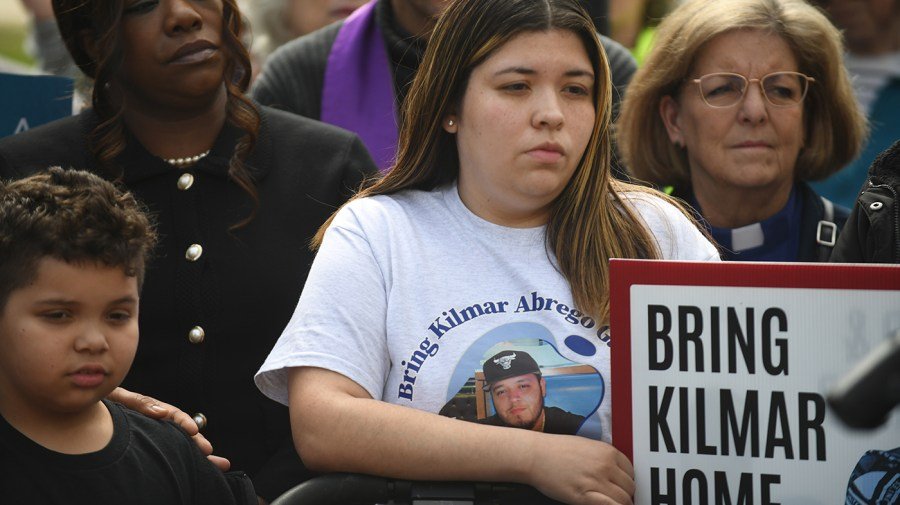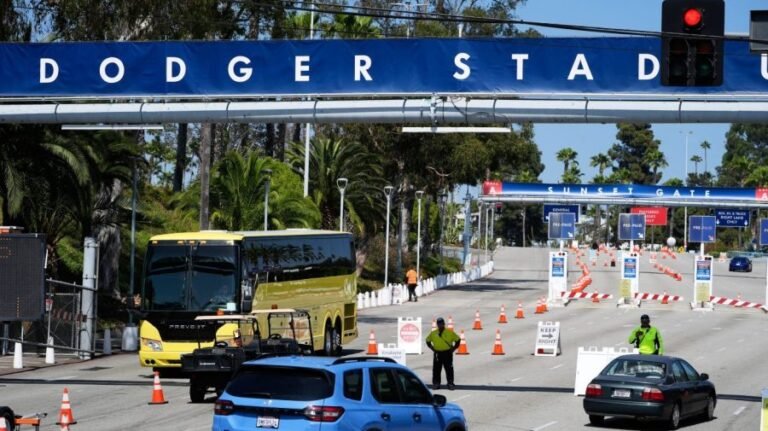
The controversy around the deportation of Kilmar Abrego Garcia intensified yet again on Wednesday.
A senator visited El Salvador, the White House held an emotive press conference with a bereaved mother, and the case was rocked by allegations of past domestic violence.
Abrego Garcia is a 29-year-old father of three who had been living in Maryland until he was detained and deported last month.
The deportation — back to his native El Salvador, where he is being held in the notorious CECOT prison — came despite a 2019 order from a U.S. immigration judge specifically protecting him from deportation to his home country.
A legal battle has been playing out ever since.
Wednesday saw Sen. Chris Van Hollen (D-Md.) fly to El Salvador to seek answers about Abrego Garcia’s detention.
Meanwhile, White House press secretary Karoline Leavitt brought the mother of Rachel Morin to the lectern of the press briefing room. In 2023, Rachel Morin was killed in especially brutal fashion by an illegal immigrant from El Salvador, who was found guilty of her murder on Monday.
Rachel’s mother Patty Morin drew an implicit parallel between her daughter’s killer and Abrego Garcia at her White House appearance, even though the latter has never been charged with a crime.
The Abrego Garcia case has become subject to intense spin from all sides.
Here are the answers to some of the biggest questions.
Is Abrego Garcia a member of MS-13, a violent gang?
The short answer is, an immigration judge said yes, but he and his family say no.
The longer explanation goes back to 2019, when Abrego Garcia first faced removal proceedings.
It is not disputed that he entered the United States illegally some years previously.
But even the way he was first apprehended by authorities is shrouded in confusion.
According to legal filings, the paperwork on this issue is contradictory. One version says he was picked up because he and other men were loitering outside a Home Depot. Another version says he was detained in relation to a murder investigation.
An immigration judge noted those contradictions, but did not resolve them, when evaluating Abrego Garcia’s 2019 request to be released on bond.
The judge denied the request on the basis that “the evidence shows that he is a verified member of MS-13.”
But here things take another turn.
The evidence in question was that he was wearing Chicago Bulls apparel and that he was identified as an MS-13 member by a confidential informant.
Even the immigration judge seemed unpersuaded by the argument about the Bulls gear. But he said the informant was a “proven and reliable source.”
Allies of Abrego Garcia strongly contest this, noting that the confidential source identified him as being active in MS-13 in New York state, where Abrego Garcia says he has never lived.
Was his deportation unlawful?
Yes — according to U.S. District Judge Paula Xinis, the U.S. Court of Appeals for the 4th Circuit, and the Supreme Court.
Xinis found he was apprehended “without legal basis” and deported “without further process or legal justification.”
An appellate judge found the government “cannot be permitted to ignore the Fifth Amendment, deny due process of law, and remove anyone it wants, simply because it claims the victims of its lawlessness are members of a gang.”
The Supreme Court ruling, which the Trump administration has labored to spin as a victory, stated in its second sentence: “The United States acknowledges that Abrego Garcia was subject to a withholding order forbidding his removal to El Salvador, and that the removal to El Salvador was therefore illegal.”
This is quite different from saying the government doesn’t have the right to deport unauthorized migrants. It does.
But, back in 2019, Abrego Garcia sought asylum and protection from removal from the U.S. on the basis that his life would be in danger if he was returned to El Salvador.
The immigration judge denied the asylum claim because the time limits to make such a claim had expired.
But he did indeed rule that Abrego Garcia should not be deported to El Salvador.
He was persuaded by Abrego Garcia’s argument that he and his siblings were in fear of their lives from a gang, Barrio 18, that had been seeking to extort the family over a pupusa business run by their mother.
The immigration judge found Abrego Garcia’s testimony in that case “credible,” “internally consistent” and supported by “substantial documentation.”
This is the center of his case: There was a valid order preventing his deportation to El Salvador, and the Trump administration did it anyway.
Has the Trump administration changed its story?
Yes.
Basically, the administration has gone from acknowledging that the deportation was a mistake to defending it.
When the courts and the media first began focusing on Abrego Garcia’s deportation, the core argument from the Trump side was that they had made an error but there was no easy way to correct it.
The appellate court quoted from the statements of a lawyer for Trump’s Department of Justice who acknowledged that it was “not in dispute” that Abrego Garcia should not have been removed .
A court filing from government lawyers on March 31 admitted that “the government erred in removing Abrego Garcia specifically to El Salvador.”
Team Trump also said the deportation was the consequence of an “administrative error.”
That position has changed in recent days. One notable example came on Monday when White House deputy chief of staff Stephen Miller vigorously defended the deportation from the Oval Office as Trump met El Salvador’s president, Nayib Bukele.
The core of the administration’s argument now is that Trump has declared MS-13 a terrorist organization, that members of terrorist organizations are not entitled to the kind of “withholding order” that protected Abrego Garcia from deportation, and that the order is thus void.
If that’s the case, it’s not clear why the administration admitted error at an earlier stage.
Is the Trump administration open to Abrego Garcia ever coming back to the United States?
Apparently not.
In a new court filing on Wednesday, the acting general counsel of the Department of Homeland Security (DHS), Joseph Mazzara, stated that the United States had no power to bring Abrego Garcia back from another sovereign country.
Furthermore, Mazzara said, if Abrego Garcia somehow was released and then presented himself to a point of entry to the United States, “DHS would take him into custody in the United States, and either remove him to a third country or terminate his withholding of removal.”
Of course, this puts the administration in conflict with Judge Xinis, who is demanding that he be returned. The Supreme Court has backed her contention that this return should be “facilitated” but has raised concerns about the wording of her initial order, which also stated that such a move should be “effectuated.”
Beyond the semantic debate, the question is whether the Trump administration will openly defy the courts.
The most likely scenario may be a return to the Supreme Court.
What about the allegations of domestic violence?
On Wednesday, the DHS published on social media a court filing from 2021 in which Abrego Garcia’s wife, Jennifer Vasquez, had filed for a protective order against her husband.
The documents stated there were “reasonable grounds” to believe Abrego Garcia had punched, scratched and bruised his wife, and that he had ripped off her shirt.
No charges appear to have been pressed in the incident.
Vasquez has also been very vocal about demanding her husband’s release and criticizing the government for its treatment of him.
The allegation is not proven nor does it in itself change the underlying facts of the deportation case. But when it comes to public opinion, it clearly makes Abrego Garcia a less sympathetic figure.


